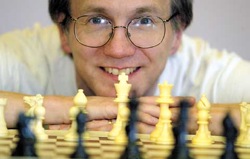There’s no sporting event that I love more than the NCAA Men’s Basketball Tournament, in part because it’s the one sporting event at which anything can happen. The famous teams have to step on the court and compete with the not-famous teams, and often the not-famous teams prove that there is more to basketball than hype.
However, until last night there was one thing that seemed impossible: A #1 seed had never lost to a #16 seed. For people who aren’t basketball fans, let me explain that the tournament has four regional sub-tournaments, so there are four #1 seeds (one for each regional) and four #16 seeds, whom the seeding committee obviously considers to be the weakest teams to qualify for the tournament.
For thirty-three years and 135 consecutive games, the surest bet in sports had been that the #1 seeds would beat the #16 seeds. When the University of Virginia tipped off against the University of Maryland Baltimore County last night, one of the commentators even said, “Take a look at UMBC now, because you won’t see them for very long.” In chess terms, this game was like a grandmaster playing, let’s say, a 1600 player.
(By the way, I’m not sure if a 1600 player has ever beaten a GM in a FIDE event, but there was this case of a 1700 player defeating a grandmaster in the 2010 Olympiad. The GM hung a mate-in-one.)
Given this preamble, you can probably guess what happened if you haven’t read about it already on the Internet. UMBC not only won, it demolished the top-ranked Virginia team by 74-54. The Virginia players just looked lost and confused, while the UMBC players were having the time of their lives.
Of course, most people hearing this news had never even heard of UMBC. But chess players know this college very well! In fact, UMBC is the chess world’s equivalent of UCLA. After the chess “Final Four” (actually called the President’s Cup) began in 2001, UMBC qualified for the Final Four fifteen years in a row, and won the championship in six of those years. UCLA had the legendary coach John Wooden, and UMBC has Alan Sherman, a computer science professor who started the chess program and made it the first college in the country to offer chess scholarships.
Believe it or not, the campus really does take pride in its chess program. Take a look at this video in which one of the UMBC basketball players, after last night’s game, is asked about the chess team and he says, “They paved the way. We looked up to them.”
Ironically, the chess team has not done so well in the last couple of years, and now UMBC is in danger of becoming a basketball school instead of a chess school! Check out this article if you want to understand why. The chess scholarship still exists, but it has not grown to match its competitors, such as Webster University and University of Texas-Dallas. While we can argue whether megabucks for chess is really such a great idea, it’s clear from the Washington Post article that Sherman is not happy with the current level of support from the administration:
“Unless the university invests in adequate infrastructure and resources for our intellectual athletes and scholastic outreach programs, UMBC chess and its positive influence in the region will continue to decline,” Sherman said.
So, let’s issue a challenge to UMBC in their moment of glory. There are two routes to success. There’s the one-time, lightning-in-a-bottle route, and there’s the kind of success that emerges from years of commitment to a vision. Let’s enjoy the first one when it happens, but keep in mind that it’s the second kind of success that really changes the world. To the administration of UMBC: Now is your chance to take some of the money that will undoubtedly flow from your basketball team’s success and reinvest it in the chess program, so that it can keep going at the highest level. Just do it!



{ 1 comment… read it below or add one }
Nice piece, Dana. I was also delighted to see UMBC pull off that win. (I heard UMBC’s president speak last year, and he was quite impressive – a deep thinker and a real booster of education.)
One minor correction: UMBC was not “the first college in the country to offer chess scholarships.” They were the first one in our modern era, but back in the mid 1970s, the University of South Florida gave some chess scholarships, enticing players such as Larry Christiansen and Ron Henley to enroll there.